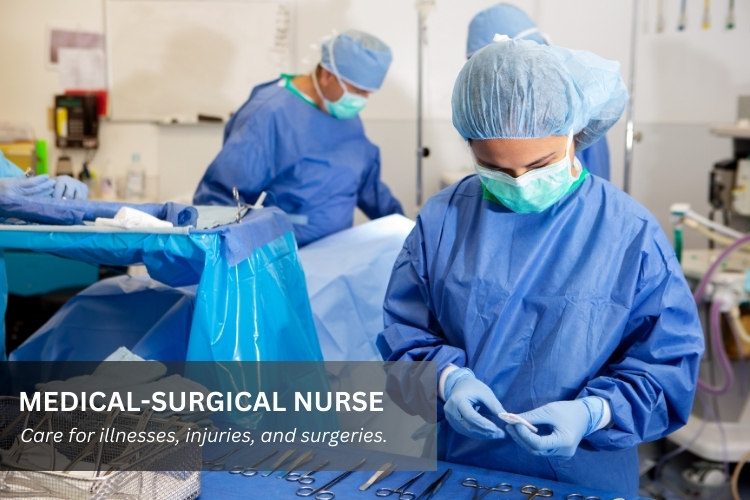Medical-Surgical Nurse (CMSRN) Career

Overview
What Is a Medical-Surgical Nurse?
A Medical-Surgical Nurse (CMSRN) is a Registered Nurse (RN) who specializes in caring for patients with a wide range of medical conditions, recovering from surgery, or undergoing medical treatments.
These nurses manage diverse patient needs, including chronic illnesses, post-operative recovery, and acute medical issues. Their role requires strong clinical skills, quick decision-making, and the ability to coordinate care for multiple patients at once.
CMSRN are valued for their versatility, as they must be knowledgeable about numerous diseases, treatments, and patient care techniques. This broad expertise makes them essential members of the healthcare team in hospitals, surgical units, and other acute care settings.
Education
How To Become a Medical-Surgical Nurse
Becoming a Medical-Surgical Nurse involves completing a nursing degree, earning RN licensure, and developing hands-on skills in medical-surgical patient care.
While this specialty is a common entry point for new graduates, many nurses choose to strengthen their expertise by pursuing the Certified Medical-Surgical Registered Nurse (CMSRN) credential after gaining work experience.
Follow these steps to become a Medical-Surgical Nurse:
- Earn a Nursing Degree. Complete an Associate Degree in Nursing (ADN or ASN) or a Bachelor of Science in Nursing (BSN) program.
- Obtain RN Licensure. Pass the NCLEX-RN exam to become a licensed Registered Nurse (RN).
- Gain Clinical Experience. Work in a medical-surgical unit or similar setting to build core nursing skills. New graduates often begin their careers in medical-surgical nursing, but additional experience in areas such as emergency or intensive care can also be valuable.
- Pursue Certification. Obtain the CMSRN credential from the Medical-Surgical Nursing Certification Board (MSNCB) to validate your expertise and expand career opportunities.
- Continue Professional Development. Stay current with evidence-based practices through continuing education, workshops, and advanced training.
How long does it take to become a Medical-Surgical Nurse? Completing an ASN program generally takes about two years, while a BSN program takes around four years. After passing the NCLEX-RN, new nurses can begin working in a medical-surgical setting immediately. However, earning the CMSRN certification typically requires at least two years of full-time RN experience, meaning it may take four to six years from the start of nursing school to achieve both licensure and certification.

Average Salary
How Much Does a Medical-Surgical Nurse Make?
The salary of a Medical-Surgical Nurse varies based on factors such as location, years of experience, employer type, and patient care complexity. On average, a Medical-Surgical Nurse earns between $65,000 and $135,000 annually, with higher salaries often available in metropolitan areas or specialized facilities.
Average annual salary for a Medical-Surgical Nurse:
- Entry-level: $65,000 – $80,000 per year.
- Mid-career: $80,000 – $95,000 per year.
- Experienced: $95,000 – $135,000 or more per year.
According to the latest data from the Bureau of Labor Statistics, the median annual wage for registered nurses was $93,600 in May 2024. The lowest 10% earned less than $66,030 annually, while the highest 10% earned more than $135,320. These figures include Medical-Surgical Nurses, who make up a large percentage of the RN workforce.
Career advancement opportunities for Medical-Surgical Nurses are extensive. Some choose to specialize in areas such as critical care, oncology, or surgical nursing, earning additional certifications that increase earning potential and clinical responsibilities.
With experience, Certified Medical-Surgical Registered Nurses (CMSRN) may advance to leadership roles, including charge nurse or nursing director positions in medical-surgical units. Pursuing a Master of Science in Nursing (MSN) can lead to advanced practice nursing or administrative roles in healthcare organizations.
Others transition into educational roles, such as nurse educator or mentorship positions, training the next generation of nurses and influencing best practices in patient care. As demand for medical-surgical nursing continues to grow, the potential for both salary growth and career advancement remains strong.
Job Duties
What Does a Medical-Surgical Nurse Do?
Medical-Surgical Nurses provide comprehensive care to patients with a wide range of medical and surgical conditions. Their responsibilities extend from hands-on clinical care to patient education, requiring the ability to manage multiple treatment plans at once.
Common job duties for a Medical-Surgical Nurse include:
- Administering medications. Ensuring patients receive prescribed drugs safely and accurately, including injections, IV management, and monitoring for side effects.
- Monitoring vital signs. Tracking heart rate, blood pressure, oxygen saturation, and other indicators to identify changes in patient condition and respond promptly.
- Wound care. Providing care for surgical wounds, including cleaning, dressing changes, and checking for infection or complications.
- Patient education. Instructing patients and families on post-operative care, medication routines, and lifestyle adjustments to promote recovery.
- Collaborating with healthcare teams. Working alongside surgeons, physicians, physical therapists, and other professionals to deliver coordinated care.
- Developing care plans. Creating individualized treatment plans based on patient needs, medical history, and expected outcomes.
- Providing emotional support. Helping patients and families cope with the stress of surgery, illness, and hospitalization.
A typical shift for a Medical-Surgical Nurse often starts with receiving reports on four to six assigned patients, each with different diagnoses and care needs. The day may involve administering morning medications, recording vital signs, changing surgical dressings, checking post-operative drains, and coordinating with physicians for updated orders.
Throughout the shift, the nurse moves quickly between rooms, responding to call lights, preparing patients for procedures, and ensuring discharges go smoothly. Charting patient updates, communicating with family members, and attending brief team huddles are woven into the routine. By the end of the shift, every patient has been assessed, treated, and prepared for the next stage of their care, whether that's recovery at home or continued hospital treatment.

Essential Skills
What Skills Does a Medical-Surgical Nurse Need?
Medical-Surgical Nurses need a combination of clinical expertise, critical thinking, and interpersonal skills to manage patients with a variety of medical and post-surgical needs. Their role demands the ability to work efficiently under pressure while maintaining accuracy and compassion.
Key skills for a Medical-Surgical Nurse include:
- Clinical proficiency. Strong knowledge of medical-surgical procedures, post-operative care, and treatment protocols.
- Critical thinking. Assessing patient conditions, prioritizing care, and making sound decisions quickly.
- Time management. Balancing care for multiple patients with varying needs within a single shift.
- Communication. Conveying information clearly to patients, families, and members of the healthcare team.
- Attention to detail. Monitoring subtle changes in patient status and ensuring accurate documentation.
- Adaptability. Adjusting to changes in patient conditions, treatment plans, and workflow demands.
- Emotional resilience. Providing compassionate care during challenging situations, including poor surgical outcomes or terminal diagnoses.
While most patients in a medical-surgical unit are stable enough to be outside intensive care, critical situations can still arise. A patient recovering well from surgery in the morning may develop an unexpected complication later in the day, requiring rapid intervention and possible transfer to an ICU or critical care unit. Handling these moments effectively draws on a nurse's critical thinking, adaptability, and emotional resilience, balancing occasional high-pressure events with the steady rhythm of general care.
Work Environment
Where Does a Medical-Surgical Nurse Work?
Medical-Surgical Nurses work in a variety of settings where patients require recovery from surgery or ongoing treatment for medical conditions. While hospitals remain the most common workplace, opportunities also exist in outpatient centers, rehabilitation facilities, and community-based care.
The most common workplaces for a Medical-Surgical Nurse include:
- Hospital medical-surgical units. Typically the largest employers, these units care for post-operative patients and individuals with diverse medical conditions requiring continuous monitoring and treatment.
- Outpatient surgical centers. Nurses in these facilities provide pre-operative and post-operative care for patients undergoing same-day surgical procedures, including orthopedic surgeries and other specialty operations.
- Rehabilitation centers. Offering extended recovery support, these facilities help patients regain function after surgeries, strokes, or complex illnesses.
- Home healthcare agencies. Some Medical-Surgical Nurses deliver care in patients' homes, ensuring smooth transitions from hospital to home and ongoing management of recovery or chronic conditions.
- Long-term care facilities. In long-term care settings, nurses provide continued medical oversight for residents with chronic or progressive health issues.
The variety of work environments allows Medical-Surgical Nurses to choose a setting that fits their career goals and lifestyle. Many begin in hospital units, gaining broad experience with different patient conditions, and later move into outpatient, rehabilitation, or home health roles for a more predictable schedule or specialized focus. Regardless of the setting, the core responsibilities remain the same, to deliver safe, comprehensive care to patients at various stages of recovery and treatment.
Questions
Medical-Surgical Nurse FAQ
What does CMSRN stand for?
CMSRN stands for Certified Medical-Surgical Registered Nurse. This certification is awarded to nurses who have demonstrated proficiency in the medical-surgical nursing specialty by passing an exam through the Medical-Surgical Nursing Certification Board (MSNCB). The CMSRN designation signifies that a nurse has the skills and knowledge to provide high-quality care to patients in medical-surgical settings.
What kind of patients are in med-surg?
Med-surg units care for adults with a wide range of conditions, including post-operative recovery, pneumonia, heart failure, diabetes complications, infections, and gastrointestinal issues. Patients are generally stable enough for floor-level monitoring but may have varying acuity.
Do medical-surgical nurses go into surgery?
Typically, no. Operating room procedures are handled by perioperative and operating room teams. Medical-surgical nurses focus on pre-op preparation, post-op recovery, monitoring, education, and discharge planning.
How is a Medical-Surgical Nurse different from an ER or ICU Nurse?
Med-surg nurses provide ongoing care for multiple stable or moderately acute patients throughout a shift. ER nurses manage undifferentiated emergencies in short episodes of care, while ICU nurses care for the most critically ill patients with intensive monitoring and lower nurse-to-patient ratios.
Is medical-surgical the hardest nursing job?
Hardest is subjective. Med-surg is demanding because of the breadth of conditions, time-sensitive tasks, and a typical assignment of several patients. Different specialties present different challenges, ER and ICU focus on high acuity, while med-surg emphasizes breadth and coordination.
Last updated: August 12, 2025
References:
- Medical-Surgical Nurse. Johnson & Johnson, Nursing Careers. Retrieved August 12, 2025.
- Academy of Medical-Surgical Nurses. AMSN.org, Professional Association. Retrieved August 12, 2025.
- Medical-Surgical Nursing Certification. American Nurses Association, Certifications. Retrieved August 12, 2025.
- Medical Surgical Nurse Salary in the United States. Salary.com, Healthcare - Nursing. Retrieved August 12, 2025.
- A Day in the Life of a Medical-Surgical Nurse. Southern California Hospital Culver City, Nursing - Day in the Life. Retrieved August 12, 2025.
- How to Become a Surgical Nurse. Eagle Gate College, Career Profile. Retrieved August 12, 2025.
- Registered Nurses. Bureau of Labor Statistics, U.S. Department of Labor. Occupational Outlook Handbook. Retrieved August 12, 2025.
- NCLEX Nurse Licensure Exam. National Council of State Boards of Nursing (NCSBN). Retrieved August 12, 2025.
- Registered Nurse. Florida Board of Nursing, Licensing and Renewals. Retrieved August 12, 2025.
- What Is the Average Medical Surgical Nurse Salary by State. ZipRecruiter. Retrieved August 12, 2025.


